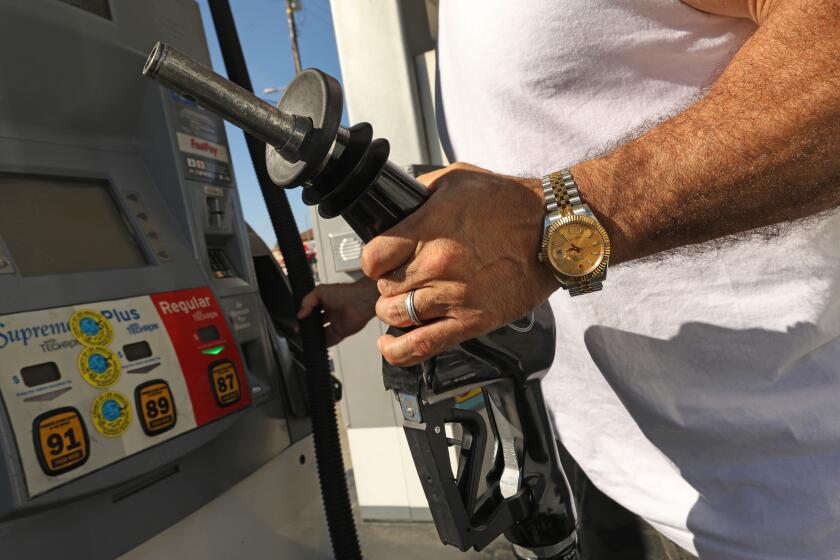Newsom, accusing oil industry of price gouging, unveils plan to cap refinery profits

- Share via
SACRAMENTO — Gov. Gavin Newsom on Monday unveiled an outline of his plan to place a cap on oil refinery profits in California, a proposal he’s asking lawmakers to approve in hopes of reducing future spikes on gasoline prices.
After convening a special legislative session, the governor publicly shared a first look at his plan more than two months after he said he would ask the Legislature to penalize what he called excessive profits by the oil industry, accusing companies of price gouging by intentionally elevating the cost of gas for California drivers.
“For me this is about never seeing those spikes again,” Newsom said at the state Capitol. “You guys are all being screwed and taken advantage of.”
The industry contends recent high prices are a result of the state’s policies to phase out the use of oil and reduce dependence on fossil fuels. The companies argue Newsom has politicized the issue and a penalty on them will only exacerbate the problem in a state that already levies heavy taxes on the industry.
The Western States Petroleum Assn. said Newsom’s proposal reads like a continuation of the “bans, mandates and public policies affecting our industry” from the governor during his tenure.
“After so many months of talking about this, we would have thought the governor would have had more details on this windfall profits tax,” said Kevin Slagle, a spokesperson for the WSPA. “To open it up and see no details on thresholds or what this penalty is and looks like and no details on the transparency side of things, it makes us wonder if this is a real public policy discussion or more of the politics we’ve seen from this governor.”
According to Newsom’s plan, the governor is asking the Legislature to enact a yet-to-be-determined “maximum gross gasoline refining margin” — or profit cap — based on a monthly calculation of the average profit per barrel that an oil refiner earns for wholesale gasoline.
The proposal would allow the California Energy Commission to impose an administrative civil penalty for violations of the profit cap, which would vary based on the percentage by which profit margins earned by a refiner exceeds the limit. Any penalties would go into a new “Price Gouging Penalty Fund,” which lawmakers could return to residents as a refund through the state budget.
At Gov. Gavin Newsom’s urging, California lawmakers are expected to begin a special session Monday to consider a penalty on oil profits in response to high gas prices.
The governor’s proposal also calls for new regulatory review and oversight, giving the Energy Commission expanded authority to investigate supply and price issues.
Newsom said he hoped the policy would deter companies from price gouging so that penalties don’t need to be levied against oil refiners.
“I hope it never goes into effect because these guys will change the way they’ve been doing business,” Newsom said.
Lawmakers opened Newsom’s session Monday as they returned to the state Capitol to begin the 2023-24 regular session and swear in legislators who were elected in November.
Though the two sessions run concurrently, any legislation passed within the parameters of the special session can take effect 90 days after adjournment. Bills approved in regular session generally do not become law until the start of next calendar year. In the special session, legislative leaders also have an opportunity to craft unique rosters of lawmakers for committees that could make it easier to approve controversial new bills.
With little activity at the Capitol during the holiday season, leaders expect consideration of Newsom’s proposal to begin in earnest early next year.
The governor’s proposal did not include a figure for a cap on profit margins, which will likely be defined in subsequent negotiations between Newsom’s office, the Senate and the Assembly. After lawmakers set a cap, the limit on profit margins would adjust annually to reflect changes in the market price and could also change at the discretion of the Energy Commission.
Under Newsom’s tentative plan, the commission could grant a refiner an exemption to the cap if the company shows “reasonable cause.”
Consideration of Newsom‘s “price-gouging penalty” created an immediate tension point for new lawmakers.
An independent expenditure committee funded by oil companies Valero, Marathon, Chevron and Phillips 66 spent more than $8 million on legislative races in this year’s elections with the intent of electing Republicans and moderate Democrats who could support the oil industry.
The industry and its allies in the business community are already fighting back. Californians Against Higher Taxes, a coalition of state and local chambers of commerce and business associations, branded the penalty as “Gavin’s New Gas Tax” in text messages sent to voters that also said, “Californians can’t afford to pay more at the pump.”
The battle over a penalty comes three months after the governor’s office successfully lobbied lawmakers to pass a series of policies to curb climate change that the industry opposed.
One of those laws established a setback distance of 3,200 feet between new oil well and homes, schools, healthcare facilities and any building open to the public. The industry beat back previous versions of the setbacks bill before Newsom engaged in the battle in August. After he signed it, the industry began gathering signatures in an attempt to repeal the law on the 2024 ballot.
Sacramento bureau chief Laurel Rosenhall contributed to this report.
More to Read
Sign up for Essential California
The most important California stories and recommendations in your inbox every morning.
You may occasionally receive promotional content from the Los Angeles Times.















